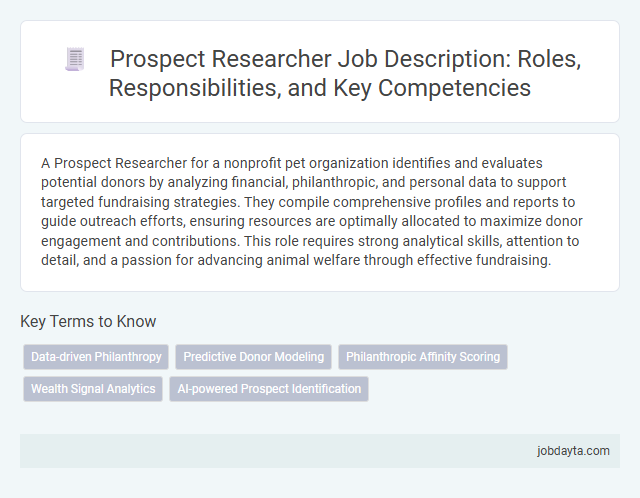A Prospect Researcher for a nonprofit pet organization identifies and evaluates potential donors by analyzing financial, philanthropic, and personal data to support targeted fundraising strategies. They compile comprehensive profiles and reports to guide outreach efforts, ensuring resources are optimally allocated to maximize donor engagement and contributions. This role requires strong analytical skills, attention to detail, and a passion for advancing animal welfare through effective fundraising.
Overview of a Prospect Researcher in Nonprofits
A Prospect Researcher in nonprofits plays a crucial role in identifying and evaluating potential donors. They gather and analyze data to uncover giving patterns, wealth indicators, and philanthropic interests.
Your work helps nonprofit organizations tailor their fundraising strategies and build meaningful relationships with prospects. This research supports informed decision-making and enhances the success of fundraising campaigns.
Essential Roles of a Prospect Researcher
A Prospect Researcher identifies and analyzes potential donors to increase fundraising success. They gather comprehensive data on individuals, organizations, and foundations to inform strategic outreach. Your nonprofit benefits from their expertise in targeting key prospects with tailored engagement plans.
Key Responsibilities in Prospect Research
Prospect researchers play a critical role in nonprofit fundraising by identifying and evaluating potential donors. Their work supports strategic decision-making and increases the effectiveness of fundraising campaigns.
- Donor Identification - Locate potential major gift prospects through comprehensive database analysis and external research tools.
- Wealth Screening - Assess the financial capacity and giving history of prospects to prioritize fundraising efforts.
- Profile Development - Create detailed reports on prospects' philanthropic interests, affiliations, and past contributions to guide personalized engagement strategies.
Critical Skills and Competencies Required
What critical skills and competencies are essential for a successful Prospect Researcher in a nonprofit organization? Prospect Researchers must excel in data analysis and interpretation to identify potential donors effectively. Strong communication skills and ethical judgment are vital to presenting findings accurately while respecting privacy standards.
Tools and Techniques Used by Prospect Researchers
| Tools Used by Prospect Researchers | Techniques Employed by Prospect Researchers |
|---|---|
|
|
Understanding these tools and techniques enables you to identify and cultivate prospective donors effectively, supporting your nonprofit's fundraising goals.
Importance of Data Analysis in Prospect Research
Data analysis is crucial in prospect research for nonprofits, enabling organizations to identify and prioritize high-potential donors effectively. Accurate data interpretation drives better decision-making and resource allocation.
You can uncover valuable insights about prospects' giving capacity and philanthropic interests through thorough data analysis. This process increases the likelihood of successful fundraising and strengthens donor relationships.
How Prospect Researchers Support Fundraising Efforts
Prospect Researchers analyze donor data to identify potential supporters with a high likelihood of contributing to your nonprofit. They provide vital insights into donor capacity, philanthropic history, and interests, enabling targeted fundraising strategies. Their work enhances donor engagement, maximizes fundraising efficiency, and strengthens overall development efforts.
Collaboration Between Prospect Researchers and Development Teams
Prospect researchers play a vital role in nonprofit organizations by identifying and analyzing potential donors. Their expertise supports the development team in crafting targeted fundraising strategies.
Effective collaboration between prospect researchers and development teams enhances donor engagement and maximizes fundraising outcomes. Sharing detailed donor insights enables personalized communication and relationship-building. Regular meetings and data sharing foster alignment on organizational goals and campaign strategies.
Career Path and Growth Opportunities for Prospect Researchers
Prospect researchers play a vital role in nonprofit fundraising by identifying potential donors and analyzing their giving capacity. Career paths in this field offer numerous opportunities for professional growth and specialization.
- Entry-Level Roles - Starting as a research assistant or data analyst helps build essential skills in data collection and donor profiling.
- Mid-Career Advancement - Progression to senior prospect researcher positions involves advanced data analysis and strategic donor engagement techniques.
- Leadership Opportunities - Experienced prospect researchers may move into management or development director roles, overseeing fundraising strategies and research teams.
Challenges Faced by Prospect Researchers in Nonprofits
Prospect researchers play a vital role in identifying potential donors for nonprofits. They face multiple challenges that impact the effectiveness of fundraising efforts.
- Data Overload - Managing and analyzing vast amounts of donor information requires advanced tools and skills.
- Limited Resources - Budget constraints often restrict access to premium research databases and software.
- Privacy Regulations - Navigating data protection laws can complicate the collection and use of donor information.
You must develop strategies to overcome these obstacles to enhance your nonprofit's fundraising success.
Related Important Terms
Data-driven Philanthropy
Prospect researchers leverage data analytics and predictive modeling to identify high-potential donors, enabling nonprofits to optimize fundraising strategies and increase donation efficacy. By analyzing philanthropic trends, financial capacity, and engagement history, data-driven philanthropy enhances targeted outreach and maximizes resource allocation for impactful giving.
Predictive Donor Modeling
Prospect researchers use predictive donor modeling to analyze historical giving patterns and demographic data, enabling nonprofits to identify high-potential donors and optimize fundraising strategies. This data-driven approach increases donor acquisition efficiency and boosts overall fundraising ROI by targeting prospects with the highest likelihood of engagement and contribution.
Philanthropic Affinity Scoring
Prospect researchers utilize philanthropic affinity scoring to analyze potential donors' giving history, social connections, and interests, enabling nonprofits to prioritize high-impact fundraising targets effectively. This data-driven approach enhances donor engagement strategies by identifying individuals most likely to contribute based on shared values and past philanthropic behavior.
Wealth Signal Analytics
Prospect researchers specializing in Wealth Signal Analytics utilize advanced data mining techniques and financial indicators to identify high-potential donors for nonprofit organizations. By analyzing wealth signals such as real estate holdings, stock transactions, and luxury asset ownership, they enhance targeted fundraising strategies and improve donor engagement outcomes.
AI-powered Prospect Identification
AI-powered prospect identification in nonprofit organizations leverages machine learning algorithms and big data to analyze donor behavior, social media activity, and financial records, enabling prospect researchers to accurately pinpoint high-potential donors. This technology enhances fundraising efficiency by prioritizing leads based on predictive analytics and engagement likelihood, streamlining targeted outreach strategies.
Prospect Researcher Infographic

 jobdayta.com
jobdayta.com